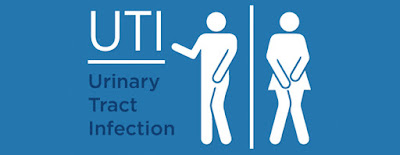A Urinary Tract Infection or UTI is one
of the most common but painful bacterial infections that affect the urinary
tract. According to statistics, more than 8 million visits to the doctor are
recorded annually for diagnosis of UTI. This condition is generally more common
in women, and for some it begins as a vaginal infection that eventually spreads
to the urinary tract. Estimates suggest that 1 in 3 women have suffered from
UTI by the age of 26 years. UTIs in men is rare; its incidence is between 5 and
8 men in every 10,000. Even if the first episode is treated, there is a high
risk of recurrence, which makes it essential to understand the condition and
the steps to prevent it.
What is Urinary Tract Infection?
Urinary Tract Infection is a bacterial
infection that affects any part of the urinary tract,
which includes the bladder, kidney, ureters as well as the urethra. Generally,
infections of the urethra and bladder are most common. These attack the lower
urinary tract, which includes the urethra and bladder. In certain cases, it
travels through the ureters and then affects the kidney. If the infection is
present only in the urethra and results in inflammation, it is called urethritis. The infection caused in the
bladder is called cystitis and
kidney infections, which are more serious, are known as pyelonephritis.
UTIs can be further broken down into two
categories: Simple and Complicated UTIs. The former attacks healthy people with
normal urinary tracts and is most common among women. The Complicated UTI is
generally found in individuals that already have an abnormal or sensitive
urinary tract, or an underlying disease that worsens the condition. It is most
frequently found in men and children.
Urinary Tract Infection: Causes
Our bodies continually fight against
infection and this generally happens through the release of urine. This
prevents bacteria to stick to the walls of the urinary tract, but sometimes,
this goes kaput and the bacteria sneaks in.
When bacteria, primarily E.coli, enters the urethra, it sticks to the wall of the urinary bladder and begins to multiply. This eventually results in a bladder infection and is the most common of UTI conditions. Sometimes, the bacteria from the bladder travels all the way up to the upper urinary tract and affects one or both kidneys.
When bacteria, primarily E.coli, enters the urethra, it sticks to the wall of the urinary bladder and begins to multiply. This eventually results in a bladder infection and is the most common of UTI conditions. Sometimes, the bacteria from the bladder travels all the way up to the upper urinary tract and affects one or both kidneys.
Urinary Tract Infection: Risk factors
- If you are a woman, it puts you at a greater risk of contracting UTI, since the urethras are much shorter than men and the bacteria can enter the tract easily.
- If you are sexually active, the bacteria can affect your urinary tract.
- After menopause, the estrogen levels in women drop, which puts them at a greater risk of UTI
- Diabetes or a weak immune system
- Poor personal hygiene
- Blocked flow of urine
- Struggling to empty the bladder
- Some contraceptive methods
- Having a urinary catheter
- Pregnancy
- Heavy use of antibiotics
Urinary Tract Infection: Symptoms
Here’s a look at the most common symptoms:- Burning sensation while passing urine
- Urge to urinate at frequent intervals
- Pain or uneasiness in the back and at times, in the lower abdomen
- Cloudy, discolored or pungent-smelling urine
- Extreme fatigue
- Fever
Urinary Tract Infection: Diagnosis
To find out if one is suffering from UTI, the urine sample is collected by the doctor to check for bacteria or its by-products. Sometimes, doctors also conduct the urine culture test, wherein the urine sample is cultured in a lab for 24 to 48 hours to see if the bacteria multiply.Urinary Tract Infection: Treatment
After the patient is diagnosed with UTI, antibiotics are prescribed to prevent the infection from spreading to the kidneys. The infection generally subsides in a day or two after the treatment begins.
It is
suggested that the antibiotics be taken as frequently as your doctor advises.
One must not discontinue the treatment abruptly. While antibiotics and other
treatments are likely to control the urinary tract infection, there may be some extreme cases
wherein it affects the kidneys.
Home Remedies
- Drink as much water as you can to urinate at frequent intervals. This will flush out bacteria from your body.
- Consume cranberries and their extracts to tackle the symptoms of UTI. You could also go for unsweetened cranberry juice, which is said to be helpful.
- Increase your intake of Vitamin C, which means more oranges, kiwi, lemon and bell peppers.
- Make sure you have probiotics in good quantity. These help in restoring the health of the urinary tract and combating bacteria.
- Do not hold urine for too long, since it leads to building up of bacteria. Also, try to pee after sexual intercourse to reduce the risk of UTI.
- Include garlic extract in your diet, since it possesses anti-microbial properties.
Ensure you
take all the precautions and practice good hygiene. After all, ‘Prevention is better than cure’.





Thanks for sharing these home remedies. Drinking more water is very helpful to treat UTI and taking antibiotics, uti herbal tablets can cures UTI completely.
ReplyDeleteUTI Treatment Singapore- UTI commonly presents with strong urgency to urinate, hesitancy, passing small amounts of urine frequently, a foul odour to the urine, possible blood in the urine, and dysuria with lower abdominal pain/discomfort.
ReplyDeleteGreat information on infections of urinary tract
ReplyDelete